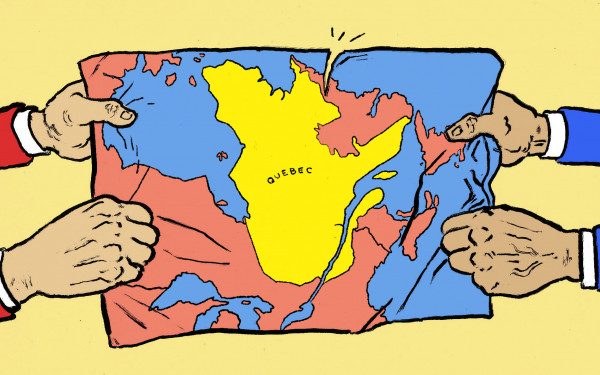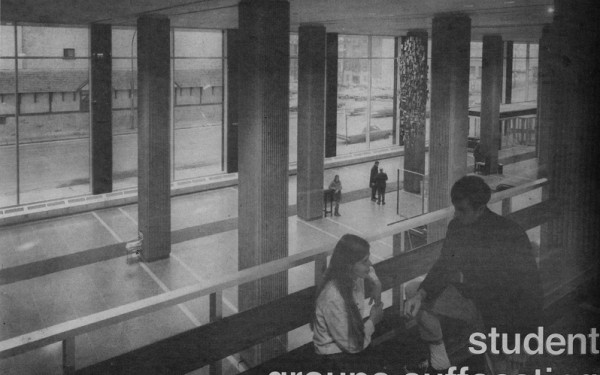A Definite Maybe: Memories of the 1995 Referendum
The Oct. 31, 1995 edition of The Link focused on an issue that this provincial election is definitely maybe not about.
“Nobody wins: stalemate vote sends out definite Maybe,” said the cover copy of The Link’s issue the morning after the crucial referendum vote. Link reporters witnessed the vote—decided by a razor-thin margin of just over 1 per cent—at the No and Yes camp headquarters.
No forces stuck in no win situation
By Alan Martin and Yves Faguy
On the eve of Halloween, Christmas came early for the No forces, as they won last night’s referendum by a vote of 50.6 per cent to 49.4 per cent.
With such a narrow victory, leaders of the No side called for Quebecers to respect the decision and to work together toward achieving their hopes and dreams.
“I want to address all Quebecers,” began Liberal leader Daniel Johnson to the growing cheers of the crowd at the Club Metropolis on St. Catherine Street. “I want to make sure there’s a rapid reconciliation between the sides.”
Pierre Patenaude, a community organizer for the CLSC, agreed with Johnson’s message.
“I sincerely hope that Mr. Parizeau will understand the message and that he will be more modest in his expectations in his projects for Quebec.”
Before the results started coming in, No supporters at Metropolis were not ready to predict the outcome. The last opinion polls, released over the weekend, had the No side trailing the sovereignists by a slim margin.
A youthful crowd cheered ecstatically as the early returns from the individual polling stations came in showing the federalists ahead. They booed when the results showed the Yes side still leading.
At 9:30 p.m., the No side surpassed the magic 50 per cent mark and the crowd went wild, chanting “Canada! Canada!” and “No! No!” while waving Canadian and Quebec flags.
http://thelinknewspaper.ca/images/blog/archives.nobody-wins1995.jpg
For Julie Forget, a 23-year-old engineer, it was the moment she had been waiting for all night.
“When the No side crossed over the 50 per cent mark it was a real relief,” said Forget. “I must admit I was really afraid, I didn’t know what I was going to do in the event of a Yes vote. My future depended on the outcome of this vote.”
Even before the sovereignist side conceded defeat, the media declared a No victory around 10:30 p.m. The interpretation of the close vote is still unclear and reactions were varied. Echoing the words of Réné Levesque, Bloc Québécois leader Lucien Bouchard appeared on Metropolis’ large video screen, promising to continue the fight for sovereignty.
But for Lise-Marie Ferguson, 24, a law student at the Université de Montréal, the outcome was a clear message to separatists.
“There isn’t going to be a next time,” said Ferguson. “This is it. Forget the next time.”
Patenaude agreed, adding the federal government could not ignore Quebecers’ desire for constitutional change.
“I’m happy the vote was so close,” he said. “Because it puts the brakes on the sovereignty movement and it sends a message to the federal government that adjustments are necessary.”
In their victory speeches both federal Progressive Conservative leader Jean Charest and Quebec Liberal leader Daniel Johnson recognized the need for change.
“Let there be no mistake,” said Johnson. “While the majority have rejected separation we also have had talk in the No side of change and pride as Quebecers.” He later went on to say, “Those who voted Yes vote for change. I tell them I hear their message. We said no to separation. We equally said no to the status quo.”
Charest emphasized the contribution made by the rest of Canada in the final days leading to the referendum.
“To all those Canadians who came and reached out,” he said referring to last Friday’s massive unity rally in downtown Montreal. “They can touch a piece of that flag and say it flies because of what they said and what they did.”
Although people at the No headquarters were relieved by the vote, the debate over Quebec’s future in Canada remains unresolved.
“It was definitely a close call,” said Claude-André Paquette, a 22-year-old student at the Université de Montréal. “It’s proof to the rest of Canada that Quebec is not bluffing. I think as a result both Quebec and Canada will mature a lot.”
Tears and cheers at Yes headquarters
By Jonathan Gatehouse and Tom Fotheringham
An emotional and bitter Premier Jacques Parizeau blamed ethnic voters for the Yes side’s narrow defeat in last night’s sovereignty referendum.
Parizeau told a crowd of 8,000 disappointed supporters at the Palais des congrès that over 60 per cent of francophones voted for independence, but “we were beaten by money and the ethnic vote.”
Parizeau appealed to new and old supporters to continue working towards their goal and not be discouraged.
“We want a country and we will have it,” he said. “Vive l’espoir. Vive le Québec.”
The crowd roared its approval and chanted “Le Québec aux Québécois.”
The evening began with jubilant cheers as the initial results from the eastern regions of the province suggested a solid Yes victory, but it ended in tears for the sovereignists. The No side came from behind to win the referendum by the narrowest of margins, 50.6 to 49.4 per cent at press time.
As the tide of returns swept from east to west across the province, the crowd waved flags and chanted, “We want a country.” When traditionally pro-sovereignist east-end Montreal began to post No majorities, the hall fell silent.
http://thelinknewspaper.ca/images/blog/archives.referendum1995.yes-no-horizontal.jpg
The momentum began to ebb as nervous and restless spectators watched their early lead erode. With 65 per cent of the vote returned, the margin between Yes and No was so slim it was being calculated in hundredths of percentage points.
Radio Canada waited until 97 per cent of the vote was counted before announcing a No victory at 10:20 p.m.
People in the hall broke down in tears, hugged their friends and waited dejectedly for three sovereignty leaders’ responses.
“Never before has a Yes victory been so close as it was today. It hurts,” said Bloc Québécois leader Lucien Bouchard.
In a voice choked with emotion, he told supporters not to give up the fight for a sovereign Quebec.
“They have not uprooted the sovereignty project,” said Bouchard. He urged followers to “plant deep roots of hope for the future.”
Bouchard warned that the narrow No victory was not an endorsement of the status quo by Quebecers, but an indication that the federal system “has never been as fragile.”
“Quebecers know that the next time will be for real,” he said. “It’s going to happen sooner than they think.”
Action Démocratic leader, Mario Dumont, stressed that a record number of Quebecers voted for radical political reform.
“The Yes side, the side of change, clearly won the campaign,” he said. “Quebecers have spoken in favour of change.”
Separatists sang several choruses of the nationalist anthem, “Gens du Pays,” in tribute to their leaders. Although faced with the grim reality of a second referendum defeat in 15 years, there was as sense of determination in the crowd rather than resignation.
On the night when sovereignists believed that Quebec would take its place on the world stage, supporters in the crowd refused to see the defeat as the end of the dream of an independent Quebec.
“It’s disappointing, it’s not demoralizing,” said 54-year-old engineer Paul Carrier. “The ball is in the federal camp.”
Marie-Rose Tessier of Montreal said that, with an almost 50 per cent vote for sovereignty, Quebec “has proven that we are strong. It’s up to Canada.”
Francois Arcand, a self-employed consultant, said Canada hasn’t worked for the past 10 years and is at a dead end. He said the No victory places the onus on the federal government to heal the country’s rifts. “Mr. Chrétien has to ask himself what he’s going to do tomorrow.”

_720_504_90.jpg)


_1_600_375_90_s_c1.jpg)


__600_375_90_s_c1.jpg)